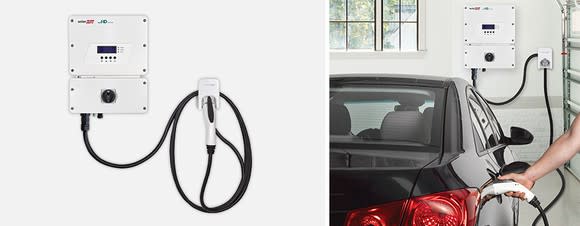4 Leaders in Solar Battery Storage
Solar energy and energy storage have always been natural partners for homeowners and businesses who want to produce their own energy. But the energy storage side of the equation has never made economic sense, partly because batteries are expensive and partly because residential and commercial solar owners can export electricity to the grid under net metering.
What's changing right now is that battery costs are coming down rapidly and net metering is coming under pressure as utilities try to fight off growing residential and commercial solar installations. That creates an opening for solar and battery storage to become a booming market as companies create the technology that allows people to produce and consume more of their energy on-site. Tesla (NASDAQ: TSLA), SunPower (NASDAQ: SPWR), SolarEdge (NASDAQ: SEDG), and Sunrun (NASDAQ: RUN) are the four companies to watch as the industry grows.

Image source: Tesla.
Tesla
Tesla's Powerwall is probably the most well-known battery for residential solar systems, making the company a leader in the market. The Powerwall combines an inverter with a 13.5 kilowatt-hour (kWh) battery and controls for your energy system. It will connect to a solar system as well as Tesla vehicles, charging when you want it to and providing backup power for the home.
Also, don't forget about Tesla's scalable Powerpack battery system. It's one of the leading products in commercial and utility scale energy storage. The company just completed a 129 megawatt-hour (MWh) energy storage system in South Australia, the biggest lithium-ion battery storage system in the world.
What Tesla can do is sell energy storage systems through SolarCity and through other installers. That makes it a solar battery storage powerhouse with a number of ways to grow in energy long-term.
SunPower
SunPower's residential and commercial businesses are built on more efficient solar panels than competitors', pushing the business toward high-end markets. These are going to be the first to see the value of energy storage, and the company is already starting to bring storage products to the market.
In its third-quarter earnings call, SunPower's management said the company has $60 million of commercial energy storage backlog and half of 2018 commercial installations could include storage. On top of that, next year residential solar systems will start being deployed with energy storage at scale. As the biggest commercial solar installer in the U.S. and one of the largest players in residential solar, SunPower is an energy storage company to watch.

SolarEdge's HD-Wave with EV charging inverter. Image source: SolarEdge.
SolarEdge
SolarEdge is in a unique position among these four companies, providing inverters and other components to residential and commercial installers without controlling the customer's point of contact. Nevertheless, the company's products are critical to many installers as the "brains" of the solar system. This gives SolarEdge a great opportunity to introduce energy storage.
The current product SolarEdge has in the market is StorEdge, a product that will provide backup power and limit solar exports in cases where that will save customers money. But an HD-wave inverter with EV charger could show where the future of the company lies. Combine the inverter with energy storage and EV charging and you have the "brains" of the solar system also acting as a homeowner's energy hub. That could be truly distruptive in solar battery storage.
Sunrun
Sunrun is now the biggest residential solar installer, and its BrightBox energy storage unit is being offered in Arizona, California, Hawaii, and New York. The product will provide backup power for homes and even shave peak energy rates where that's economical.
The batteries are from LG Chem, one of the leading battery companies in the world. What Sunrun provides is the installation network and controls behind the scenes, which will be a valuable component to own long-term. As more residential solar and energy storage systems are installed, there will be an opportunity to monetize the network of batteries for grid services. And since Sunrun actually owns the solar and energy storage system, leasing or selling energy to customers, it has more control than other competitors who might sell the energy storage system to the end customer. And the massive network of installers will be very valuable for getting energy storage into the field.
Solar and energy storage will be big business
As utilities fight back against solar with higher fixed fees and less net metering, energy storage will be a valuable addition to residential and commercial solar systems. That'll increase the value solar companies can offer to customers. Tesla, SunPower, SolarEdge, and Sunrun are the four companies to watch as solar plus storage grows.
More From The Motley Fool
6 Years Later, 6 Charts That Show How Far Apple, Inc. Has Come Since Steve Jobs' Passing
Why You're Smart to Buy Shopify Inc. (US) -- Despite Citron's Report
Travis Hoium owns shares of SunPower. The Motley Fool owns shares of and recommends Tesla. The Motley Fool has a disclosure policy.

 Yahoo Finance
Yahoo Finance 